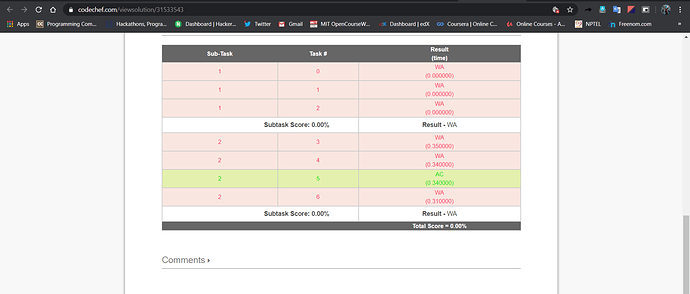CodeChef: Practical coding for everyone is the link to my code.
Yes, it is yielding a wrong answer despite passing the given test case . Can anyone tell me why is it so? The logic applied seems to be correct .
my approach is same as yours . but only got WA please have a look.
#include <bits/stdc++.h>
using namespace std;
long long int um(int a[], int n, int sum)
{
unordered_map<long long int,long long int> pum;
long long int res = 0;
long long int cum = 0;
for (int i = 0; i < n; i++) {
cum += a[i];
if (cum == sum)
res++;
if (pum.find(cum - sum) != pum.end())
res += (pum[cum - sum]);
pum[cum]++;
}
return res;
}
int main()
{
int t ;
scanf("%d",&t);
while(t–){
int n,i;
scanf("%d",&n);
int a[n],b[n];
for (i=0;i<n;i++)
scanf("%d",&a[i]);
for(i=0;i<n;i++){
if (a[i]%4==0)
b[i]=2;
else if(a[i]%2==0)
b[i]=1;
else if(a[i]%2==1)
b[i]=0;
else
b[i]=3; }
long long int k,m=(n*(n+1)/2);
k=m-um(b,n,1);
printf("%lld\n",k);
}
return 0;
}
please look at my solution , Don’t know why it giving WA .
https://www.codechef.com/viewsolution/31565416
thanks
I think automatic typecast is the problem.
Initialise the count as count = n*(n+1)/(long long)2;
Also the right count and left count product to be subtracted as
count -= (lcount+(long long)1)*(rcount+(long long)1);
Hope it helps 
I am attaching my code here
Can anyone tell what is the problem as I am getting AC in 1 subtest and WA in all others
#include<bits/stdc++.h>
using namespace std;
int n,i,pos2=-1,pos4=-1,pos0=-1;
long long int aa,ans=0;
int ab[100010];
int check0(int p1, int p2 ,int p3)
{
if(p3>=p1 && p3>=p2)
return 0;
return 1;
}
int main()
{
int t;
cin>>t;
while(t!=0)
{
ans=0;
cin>>n;
for(i=0;i<n;i++)
{
cin>>aa;
aa=abs(aa);
if(aa & 1)
ab[i]=1;
else if(!(aa%4) && aa!=0)
ab[i]=4;
else if( aa!=0 )
ab[i]=2;
else
ab[i]=0;
}
pos0=-1;
pos2=-1;
pos4=-1;
for(i=0;i<n;i++)
{
if(ab[i]==1)
{
ans+=(i-max(pos2,pos0));
}
else if(ab[i]==4)
{
ans+=(i-pos0);
pos2=-1;
pos4=i;
}
else if( ab[i]==2 )
{
if(check0(pos2,pos4,pos0)==0)
pos2=i;
else
ans+=(max(pos2,pos4)-pos0);
pos2=i;
}
else if(ab[i]==0)
{
pos0=i;
}
}
cout<<ans<<" \n";
t--;
}
return 0;
}
@arftdipto because we assign odd number by 0 and even by 1. and the only subsequence that can’t be represented as difference of two integer is odd * even = even . So when 1 + 0 = 1 . there is a sub sequence of odd and even which will result in odd .
we can’t have sum 1 + 2 . Because 1(even with mod 4 == 2) + 2(even with mod 4 == 0 ) will result in a number that can be represented as difference of two integer. We are trying to get answer conversely so we can’t take that .
@coastaldemigod you program works only for the test case having array of odd numbers . I had the same AC in test case 5 . I figured it out It was failing for other cases . Try Editorialist’s approach to get AC in all.
typecast unsigned long long int to all the variables.
Can anyone help me understand why my code with unsigned long long int works and not long long int
Thanks bro 
But I couldn’t understand the reason behind it .
Can you please elaborate on this answer += seen[sum-k]
Got it. Thanks bro!
I also want to know .
